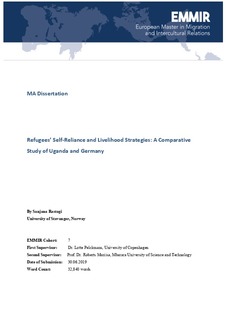| dc.contributor.advisor | Pelckmans, Lotte | |
| dc.contributor.advisor | Muriisa, Roberts | |
| dc.contributor.author | Rastogi, Sanjana | |
| dc.coverage.spatial | Uganda and Germany | nb_NO |
| dc.date.accessioned | 2019-10-04T13:20:34Z | |
| dc.date.available | 2019-10-04T13:20:34Z | |
| dc.date.issued | 2019-06-30 | |
| dc.identifier.uri | http://hdl.handle.net/11250/2620390 | |
| dc.description | Master's thesis in Migration and Intercultural Relations | nb_NO |
| dc.description.abstract | While some migrate with choice, others are forced to leave. This master thesis deals with the situation of Eritreans, Ethiopians and Somalis who had to leave their country either because of war, political insecurity or economic problems to seek haven in Uganda and Germany. These two host countries have been the vanguard in welcoming refugees especially when compared with neighbours in their respective continents. Globally, politicians have espoused fascist and nationalist viewpoints in exuding refugees as a burden on host societies rather than individuals who were once free and had both the possibility to move and skills to work for
earning their livelihoods. Time and again, instant relief aid has played a vital role in the lives of refugees but its prolonged usage has also resulted in increased dependency. Therefore, ‘refugees need help’ is a common rhetoric that diverts attention from ‘refugees’ ability to help themselves’, which lies at the core of this thesis. The conceptual framework of Uganda’s refugee management policy of self-reliance and livelihoods understood as refugees’ agency and transformation are synthesized with the theoretical framework of Amartya Sen’s capability approach. Comparative qualitative content analysis allows for an evaluation of the experiences of six
refugees in Nakivale Refugee Settlement (Uganda) and five refugees in the cities of
Oldenburg and Bremen (Germany) with a balanced gender ratio of six males and five females. The findings suggest that older refugees from the Horn of Africa seek refuge in Uganda, whereas younger refugees move further afield to Germany. Refugees’ micro-level experiences in Nakivale Refugee Settlement counters expected agricultural inclinations by exposing a new dimension of business proclivities, necessitating a re-allocation of development funds on the macro level. Likewise, refugees’ experiences in the cities of Oldenburg and Bremen shows that most find work in the temporary job sectors; nevertheless, they stressed their need to work in the permanent job sectors. Searching for permanent jobs requires enhanced integration of refugees’ unique skills and talents within the German labour
market, in order to provide them with a sustainable future. | nb_NO |
| dc.language.iso | eng | nb_NO |
| dc.publisher | University of Stavanger, Norway | nb_NO |
| dc.relation.ispartofseries | Masteroppgave/UIS-HF-IGIS/2019; | |
| dc.rights | Attribution-NoDerivatives 4.0 Internasjonal | * |
| dc.rights.uri | http://creativecommons.org/licenses/by-nd/4.0/deed.no | * |
| dc.subject | migrasjoner og interkulturelle relasjoner | nb_NO |
| dc.subject | refuge | nb_NO |
| dc.subject | international forced migration | nb_NO |
| dc.subject | self-reliance | nb_NO |
| dc.subject | livelihood strategies | nb_NO |
| dc.subject | flyktninger | nb_NO |
| dc.title | Refugees’ Self-Reliance and Livelihood Strategies: A Comparative Study of Uganda and Germany | nb_NO |
| dc.type | Master thesis | nb_NO |
| dc.subject.nsi | VDP::Social science: 200::Human geography: 290 | nb_NO |

